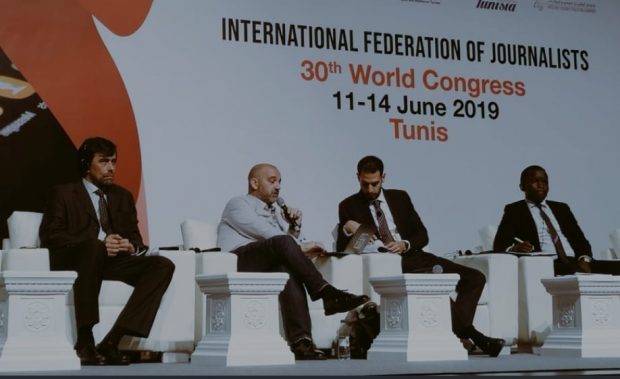IFJ Congress discusses future of journalism in digital age
Tunis: The 30th World Congress of the International Federation of Journalists (IFJ) opened on June 11 in the Tunisian capital Tunis.
Over 300 participants representing journalists unions and associations across the world are attending the Congress that has put the future of journalism in the digital age at the top of its agenda for the June 11-14 gathering.
The Congress, the first to be held in an Arab country and on the African continent, started with a pre-conference that featured debates on three key issues: the future of journalism in the digital age, good trade union practices around the world and the situation of journalism in the Middle East after the Arab Revolutions. All panels include leading practitioners from around the world, the IFJ said in a statement.
Delegates will also discuss and adopt a new IFJ Global Charter of Ethics for Journalists, also known as the Bordeaux Declaration, and which was first adopted in 1954 by the IFJ’s World Congress and last amended in 1986. The latest amendments will take on board ongoing media challenges and encourage journalists to abide by the highest ethical standards at a time when debates over disinformation are raging. The IFJ, an organization that boasts 600,000 members from more than 180 affiliated unions in 140 countries, said it would actively promote the charter in workplaces and media across the world.
“The adoption of the Global Charter of Ethics for Journalists will be a milestone in the history of the IFJ because ethics was one of the IFJ’s founding pillars when it was created in Paris in 1926,” IFJ General Secretary, Anthony Bellanger, said. “This new document builds on the professional duties laid down in 1954, but it also puts an emphasis on rights, in a world where journalists’ rights are being abused. Tomorrow, all journalists around the world will be able to identify themselves with the IFJ Global Charter of Ethics and use it to defend themselves against unscrupulous employers”.
Delegates will also debate and approve the IFJ 2019-2022 working program. This roadmap seeks to strengthen the position of the IFJ as the global voice for journalists and journalism and to support its member unions worldwide in their mission to build global solidarity at the forefront of struggles to tackle precarious work and abuses of labor rights, lead the fight against impunity for crimes against journalists, mainstream gender equality in media and strengthen the regional organizations of journalists. Delegates will also elect a Gender Council, a new IFJ President, and an Executive Committee. Ahdeya Ahmed, the president of Bahrain Journalists Association (BJA) said she was looking forward to greater empowerment of women that would reinforce the protection of media women across the globe. Ahedya made history in Bahrain this year when she was elected the first woman president of the association.
According to the Brussels-based IFJ, more than 60 motions have been tabled for debate, including motions urging action on gender equality in media, the promotion of the UN Convention on the Safety of Journalists, measures to tackle disinformation, the condemnation of the attacks against journalists and press freedom in numerous countries and in defense of collective bargaining for freelancers and journalists’ author’s rights, among others. “The triennial IFJ Congress allows delegates from all over the world to meet, discuss the IFJ working program and elect a new Executive Committee and new leadership,” IFJ President, Philippe Leruth said. “The Tunis Congress will be historical, as it is the first time the IFJ will hold its congress on the African continent and in an Arab country. It will also provide an opportunity to address the important challenges facing journalists in a changing media landscape and strengthen the IFJ campaign against impunity surrounding journalists’ murders.”






















































